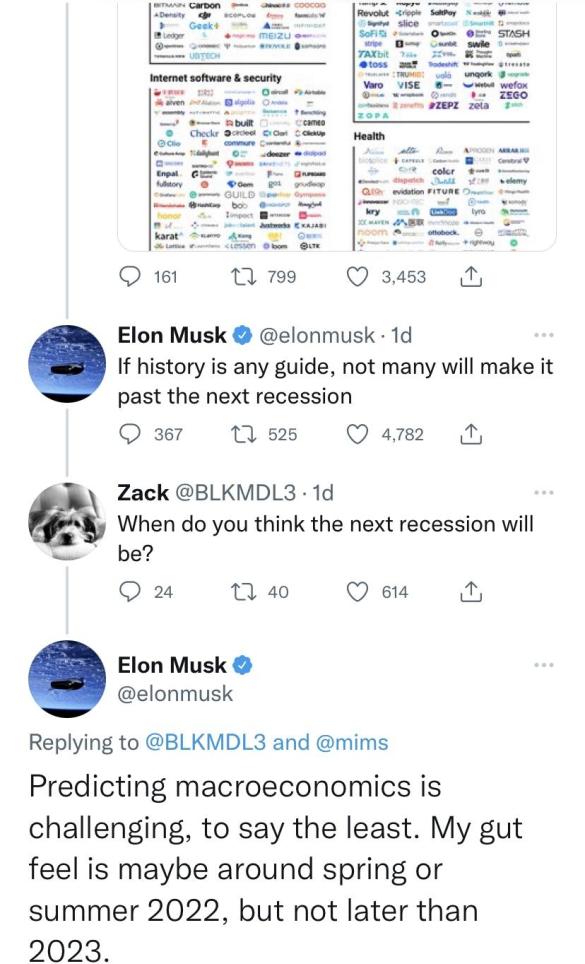In the new Chinese New Year's Eve, Musk, the genius founder of tesla and SpaceX, suddenly tweeted that the U.S. economy was going into recession in 2022. His remarks have aroused the discussion and attention of many people. It is well known that the Fed plans to tighten monetary policy in 2022. So is there any connection between Musk's "U.S. recession" and the Fed's monetary policy? The author hopes to give you some background analysis through this article.
01
Musk's forecast of the U.S. macroeconomy
Musk is tweeting on the evening of December 30, 2021, his views on the U.S. macroeconomy. The cause of the incident was Wall Street Journal's technology reporter Christopher. Christopher Mims tweeted: There are currently 936 unicorns (startups valued at more than $1 billion) around the world, what do you think will be the case in 5 years? His tweets were accompanied by a list of 936 unicorns from countries around the world. The 15 sectors covered include Artificial Intelligence, Retail, E-Commerce, EdTech, Hardware, Internet Security, Supply Chain, Automotive, Internet Software, Data Management Analytics, FinTech, Healthcare, Mobile Communications, Travel and others. It can be said that these companies are currently the leaders of the global new economy, and investors are very optimistic as a whole.
In response to Twitter, Musk replied that "if history leads us, there are not too many companies here that can survive the next recession." Then a Tesla executive asked: When do you think the next recession will be? Musk's answer is as follows:

Musk tweeted about macroeconomics
Musk said forecasting the macro economy is the least challenging. His instinct is that there will be a recession in the spring or summer of 2022, but no later than 2023 at the latest. That said, Musk believes there is a high probability that there will be a recession this year or next year.
02
The U.S. recession and the Federal Reserve's three axes
The author believes that Musk's judgment on the timing of the US recession is highly correlated with the Fed's tightening monetary policy schedule. The Fed has repeatedly announced its intention to tighten monetary policy. The 2022 Three-Plate Axe consists of the following steps:
1, complete the withdrawal of quantitative easing in the first quarter. The time came at the end of March this year, which was twice as fast as planned in the middle of last year.
2, in the second quarter began to raise interest rates, currently look forward to three rate hikes, the federal funds rate is close to 1%.
3, open market operations, selling the bond positions held, shrinking the balance sheet.
It can be said that these three steps are more violent than one. The tightening effect on financial markets is expected and will also lead to a recession in the real economy. From a point in time, the summer of 2022, after the Fed's interest rate action began, economic growth slowed, and then entered a recession is also more consistent with Musk's predictions. Of course, the inertia of economic growth is still there, and the possibility of a recession occurring in the first half of 2023 is relatively large.
03
Why isn't the Fed afraid of recessions?
The Fed system has the most detailed financial and economic database in the world, employs more than 500 Doctors of Economic Research, and has a very deep understanding of financial markets in both theory and practice. For recession predictions, the Fed's dynamic model has a very good function. After the Fed tightens monetary policy, a recession is inevitable. Why isn't the Fed afraid of a recession?
I think the most central cause is inflation. U.S. inflation is now at 6.8 percent, well above the Fed's statutory inflation target of 2 percent. The labor market is extremely tight, and a large number of companies are short of employees. An average of 5 percent of U.S. corporate employees now quit their jobs every month. Many Americans I know have recently seen more than 40 percent of their income growth when they change jobs. In fact, the U.S. economy is currently experiencing heat. Recent Wall Street discussions on how to achieve a soft landing in U.S. economic growth. With the U.S. economy already very close to full employment and inflation well above target, squeezing the bubble through a recession should be a very rational choice. The cause of economic overheating is nothing more than supply outstripping demand. The current global situation is one of strong demand and insufficient supply. If a recession occurs, it helps reduce over-strong demand, cools the overheated labor market, and helps balance supply and demand.
Back to Musk's prediction, in the era of 936 unicorns in the world, if there is no recession to carry out the survival of the fittest, the consequences of the waste of resources in the market are more serious. And if they survive a recession, these unicorns will become stronger and more successful in the true sense of the word. From the perspective of the Fed's operation, once the recession is confirmed, that is, two consecutive quarters of negative economic growth, the Fed can quickly stimulate the economy by relaxing monetary policy and open a new round of economic growth.